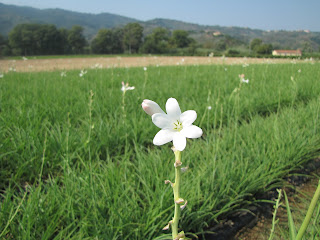Heritage
A report just came out on October 27th about how the Grasse, France fragrant plant extract yields are down 40% due to drought and rising temperatures, and it got me thinking that instead of freaking the hell out, why not figure it out? So I started poking around on the internet to see what, besides losing one's mind, could be done, and it's pretty clear that the "fix" will be found in technology and advanced growing practices, like vertical farms. This year, my garden-growing child and I will be using vertical growing techniques to maximize the space in our wee backyard food garden to grow tuberose, and will eventually use space in the garage to continue the experiment with indoor vertical growing to further maximize yield. Duplicate the exact temperatures, water volume, and soil conditions where these gorgeous florals grow best. Well, as much as we can with our limited funding and expertise. It's worth a shot, right? For now, though, it's an outdoor operation. I've always got decent yields from my tuberose bed until this past year. Not a single sprouted bulb produced a flower stalk. It could be that the bulbs were old and done, or it could be that my persistent pleas to water the tuberose went unheeded, or it could be the soil was depleted of the proper nutrients or ... well, it could have been all or a combination of these and other factors, like heat, the bottom line is that there was no tuberose harvest. No tuberose enfleurage. I have always, as a rule, instructed my students to grow as much of their own perfumery plants as possible, if not to harvest and use in their work, but to at least study and smell the live plant or flowers as a tool to help ensure the same extract of the plant or flower bought from a supplier can be reasonably determined to be real or not real. Vertical growing in small spaces could be the answer to some of these students' limited growing spaces.
One of the cons of working with naturals is this issue of yield per acre, water needs per acre, environmental impacts, and on and on. Natural perfumers are mocked and denounced at nearly every European perfumery convention and these are the dog whistle issues they spout to do it, while on the other hand they virtue signal about the efforts they take to preserve perfumery's heritage by supporting (and purchasing) fields and fields and fields of natural perfumery materials around the world. The real issue is that they think it's their heritage, and not ours.



Comments
Post a Comment